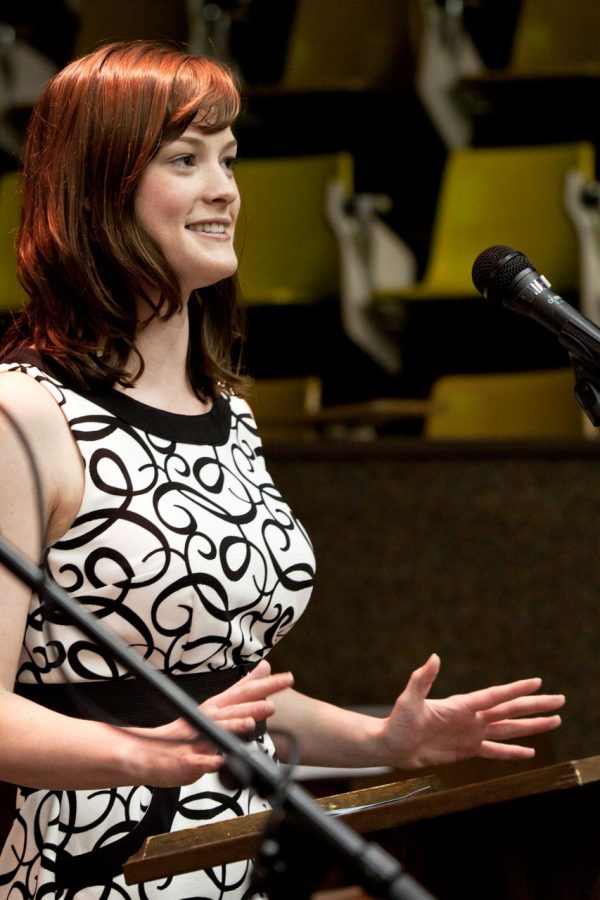Candidates debate, share ideas with students
March 15, 2012
SGA presidential candidates Will Riley and William Nash went head-to-head in a presidential debate hosted by The Flor-Ala newspaper March 8 in Stevens Hall auditorium.
There were more than 100 students and faculty members in attendance, and the crowd was engaged during the debate.
The candidates were asked what their stance is on the D-I decision and how they plan to work with the student population during this time of transition.
Riley responded first, speaking in favor of the decision. He said the student voice was heard during the decision-making process, but there are other factors that have to be considered. Riley also encouraged students to look at the decision from a long-term perspective.
“It can be a rocky road if we don’t comply and work with the board of trustees during this move,” Riley said. “But we’re going to receive several thousand dollars for the university and athletics if we move to D-I.”
Nash said the decision was made solely based on athletics. Fees might have been easier for students to handle and the community would have had more preparation for the move if the university had waited to make the decision, he said.
Both candidates also agreed that the current parking situation is less than satisfactory, and their efforts would both largely include longer shuttle bus routes to pick up more students from off-campus locations.
Riley and Nash were asked how they would improve the campus food service program Sodexo.
“A lot of students complain about Sodexo, but they don’t ever say exactly what’s wrong,” Riley said. “We should not complain about Sodexo, but we should complain to Sodexo.”
Nash said Sodexo has shown an effort to improve its services since it has been operating at UNA.
“They’ve shown a real commitment to bettering themselves and the community,” Nash said.
Both candidates shared their ideas for making SGA more accessible to students.
Nash wants to follow in the footsteps of what SGA is currently doing, as well as improve the Ideas to Actions program. He wants SGA members to spend more time talking to students and finding out what their concerns are.
Riley said he will make sure there are consistent biweekly updates for students. He also believes that, instead of continuing to recruit people for SGA, the people in SGA need to start recruiting fans of SGA.
Disability services awareness—part of Nash’s platform—was the next topic of discussion at the debate. Riley said the university needs to seek out more students with or close to disabilities for input and guidance, as well as add more handicapped-accessible parking spots on campus.
Nash highlighted specific areas on campus that need improvement for those with disabilities, including a lack of railing on campus, the chairlift in Bibb Graves Hall and the paperwork process students with disabilities have to go through at the start of each semester.
“We need less bureaucracy and more power to the students,” Nash said.
The final question from the moderators dealt with the integration of international students on campus. Nash wants more international students involved in SGA in the upcoming year, while Riley talked about the long-term goal of having a multicultural center built on campus.
After a short break, the candidates were asked four questions from the audience, as well as a surprise question from the moderators. The first student question focused on the D-I debate, to which the candidates briefly restated their thoughts and opinions.
Both candidates said they have strong plans for the continuation of becoming a greener campus in the upcoming year, which was focused on heavily in the debate.
“I want more recycling bins around campus,” Nash said. “We have to provide the means for recycling, and then educate about recycling.”
Part of Riley’s platform is conservation, and one of his biggest plans includes going paperless in different areas of the university.
“I want to move towards having almost all applications online,” Riley said. “I also want to explore the option of having refund checks direct deposited instead of printed for students.”
A surprise question from the moderators asked each candidate to speak about what makes them different from his opponent.
Nash said his military experience and work in dealing with real student issues is the leading factor that sets him apart. Riley feels his experience on the executive board of SGA as the current vice-president and past experience with voting and legislation make him different.
Current SGA President, Ralph Akalonu, said that both candidates are good, but there is room for improvement with the presentation of their platforms.
“The debate has been good, and the candidates are both good,” Akalonu said. “I would really like to hear more specifics about their plans, though. They need to focus on more specifics, instead of rushing through them.”
Overall, the debate was well-received by students.
“I’ve enjoyed it,” said Daniel McGuire, a computer science major. “The debate format was good, and I’ve enjoyed the candidates’ dedication to the presentation of their information. That’s why I came tonight- to get information.”
Getting to know the candidates through the debate was a highlight of the event.
“It was good to see their faces and body language,” said Harrison Knowlton, a junior criminal justice major. “You could also see their confidence levels and the way they handled themselves. They both portrayed good stuff and knew what they were talking about.”
Riley’s campaign is based on three key concepts: conserve, coordinate, and communicate. Riley hopes to continue the push for UNA to become a more environmentally friendly campus. He is also advocating for stronger communication between university officials and students.
Nash is running his campaign with four central ideas that he feels students at UNA should be aware of. His platform is based on campus beautification, a higher level of disability support services, raising awareness of veterans’ affairs, and lowering textbook costs through an Adopt-a-Book program.


